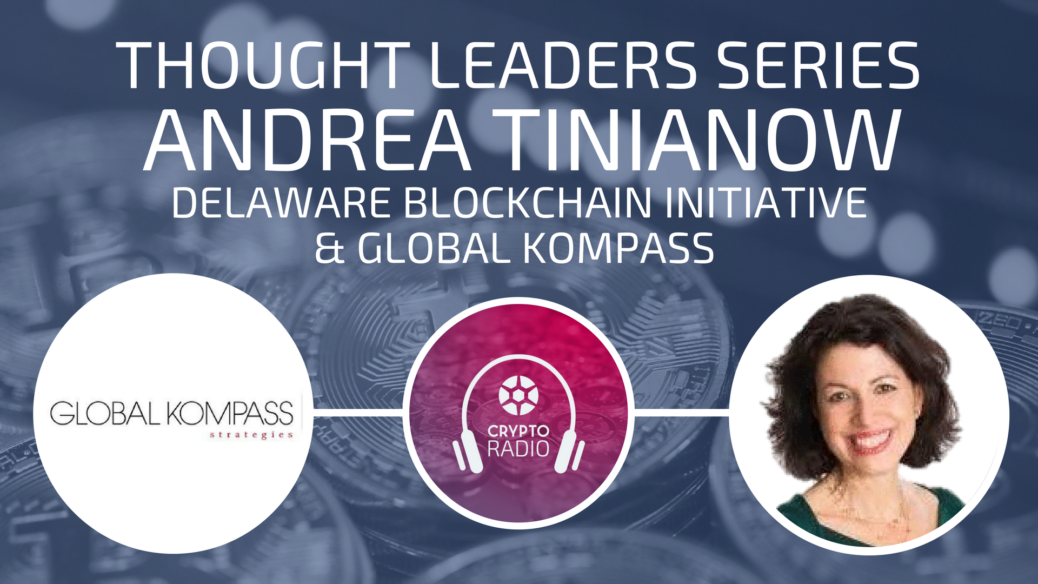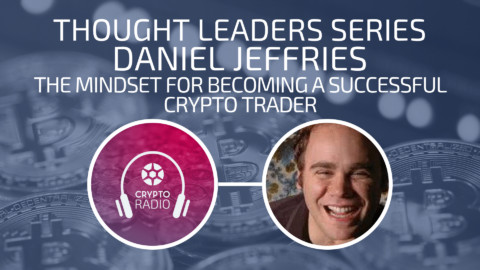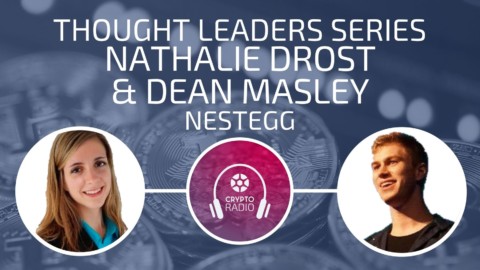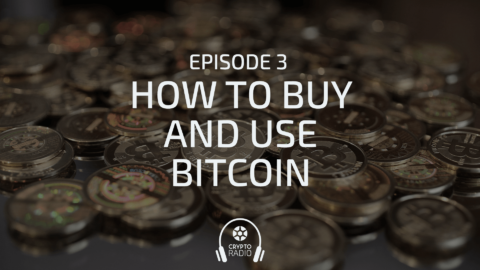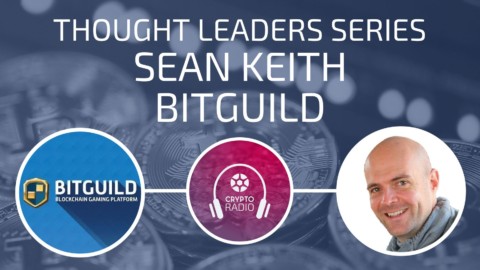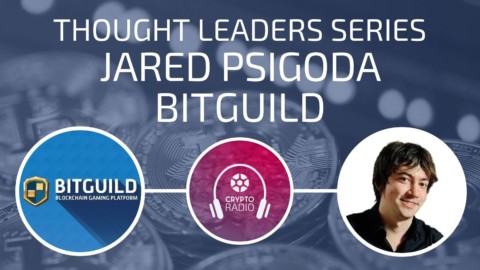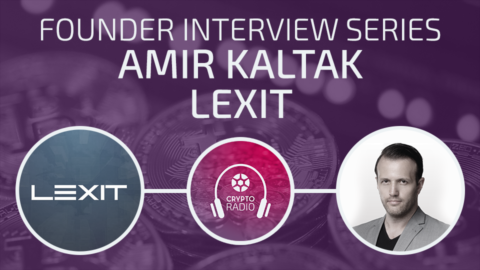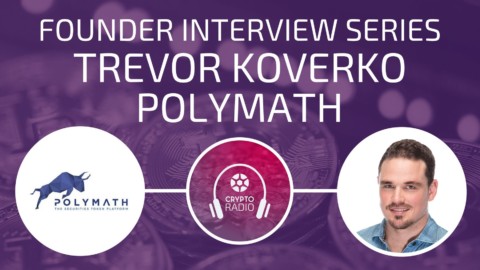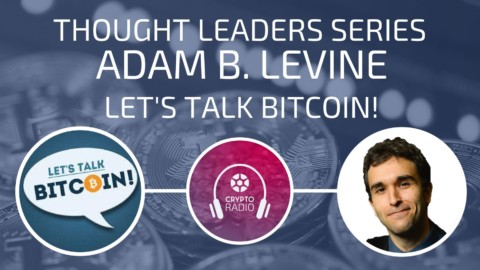Podcast: Play in new window | Download
Chris: What’s up crypto world and welcome to Crypto Radio. My name is Christopher Sparks. [00:00:30] Today on the show for our thought leader’s series I will interview Andrea Tinianow of the Delaware Blockchain Initiative and Global Kompass. In 2016, Andrea along with a number of other well-known blockchain lawyers began Delaware Blockchain Initiative. The goal of the Delaware Blockchain Initiative, or DBI, is to put forth a plan to enable blockchain based corporate governance in the state of Delaware. This past summer they were successful in effecting changes and policy in the state that is the preeminent corporate governance leader in the both the US and worldwide, [00:01:00] the small state of Delaware.
The implications of this policy, which enables companies to register legal information on the blockchain, are legitimizing for the industry as a whole and stands to pave the way in gains of efficiencies and utilization of data in ways lawyers have only been dreaming about. Let’s let Andrea tell her story with her contagious enthusiasm. Welcome Andrea, thank you very much for joining us on the cryptoradio.io podcast. Maybe you could just start by giving us an overview on what the Delaware Blockchain Initiative actually is?
Andrea: Sure. The Delaware Blockchain Initiative [00:01:30] was launched in 2016 with Governor Jack Markell, and the idea was for the state to throw its support behind blockchain technology, commit to use the technology and, at the time, ask the corporation law council to amend the law, amend the state law, to expressly authorize companies to issues shares on a blockchain. The initiative also contemplated that there would be a person at the state, and at the time that was me, [00:02:00] who would be interfacing with the public so that we could really take this initiative and animate it and take it to life, make it real.
Chris: What exact function is the blockchain serving now in the Delaware Blockchain Initiative? What is it doing for the state?
Andrea: Right now, the initiative is still working through the passes, there’s legislation passed last summer and that was the legislation that Governor Jack Markell had asked the corporation law council to consider passing. [00:02:30] And there’s a group that is at the state of Delaware that is exploring the technology and how to integrate and how to move forward with some of the promise of the initiative. There is no integration right now though.
Chris: Okay. So, what problems is it actually solving?
Andrea: I’m sorry, sure. There are so many problems. How do I begin? Well, one of the initial projects was to integrate the [00:03:00] technology with the public archive. So, the idea is that public archives in the state of Delaware is responsible for managing all of the documents, all the digital information that is no longer in use. That is, it’s been used and then it’s being held for a period of time, and then it’s going to be destroyed or these are, let’s say, precious documents or birth certificates or certain other types of artefacts that need to be held onto for historical reasons.
So, the public archive [00:03:30] has a pretty big role, because they are the repository for all this information not just at the state level but at the county level. And you can imagine keeping track of so many owners, so many documents, so many destruction periods. Because every type of document has its own, what’s called a destruction period, the time after which they hold it for a specific amount of time and then it gets destroyed, so you can just imagine how difficult it is to keep track of all those documents. These documents, they’re supposed to be made [00:04:00] available to the public if they’re not confidential, they’re not classified.
Chris: You’re talking about physical paper documents?
Andrea: No, not just physical paper but digital information, as well. So, the idea is how do you keep track? How does any one person or entity or government keep track of all of those documents? Destroying them when they need to be destroyed on time? So, the idea behind putting these documents on the blockchain was that they would run through a smart contract and each category of documents would be classified, each with its own destruction period. [00:04:30] And because we were working with Symbioun technology, the documents, actually digital information and physical documents that could be digitized, would actually be on the blockchain it would not just be a registry with a hash.
All the documents would actually be on the blockchain so that through the smart contract, when the time period was up when they were to be destroyed, they would no longer be able to be accessed. That’s a problem most jurisdictions have, most corporations have. Before I move to the state of Delaware, just to give you a little bit of [00:05:00] background about myself, I’m a Delaware lawyer. When I was first at a school I was in business for about 10 years doing marketing and business development. After law school, I walked with a law firm and then I was with a large global services company and I was their number two lawyer. Part of my job was to develop the document retention policy.
I can tell you that every corporation big and small, document retention is not an easy feat. It’s hard to keep track of the documents, it’s hard to destroy them at the right time. [00:05:30] They talk about documents as sort of being like fish; you don’t want them hanging around after they’re – seriously, after that retention period has completed, you don’t want them hanging around because they become a liability. You want them destroyed when you can destroy them. So, the smart contract that we had developed with Symbioun in connection with the Delaware Blockchain Initiative, that was going to solve that problem.
Chris: Do you have any figures on savings? I know that document destruction alone, you have to hire a truck to come and physically destroy these documents?
Andrea: Here’s the thing, it’s not [00:06:00] even the cost of destruction. Most companies will pack up their documents after they’re done working with them, they’re no longer actively in use. They package them up and they send them to a warehouse, to a company that will keep track of them. Every month, every week, they’re sending documents offline to a place like Iron Mountain. That’s very expensive. It’s actually more expensive, I guess it’s more expensive to shred them than to maintain them so often.
[00:06:30] Companies will, rather than shred them, or organizations, rather than shred them, they just keep on sending them offsite. Like I said, that just creates more liability for the organization. I can’t give you numbers, but I suspect it would be very easy for you to do an estimate if you knew how much companies are being charged to store documents, to destroy documents. It’s massive. It’s massive.
Chris: I can only imagine if somebody broke in or had nefarious purposes to go digging [00:07:00] through something, there would be a big issue there.
Andrea: Well, I imagine, but I suspect companies like Iron Mountain, their reputation is really reliant on the security of the documents. But any time you have what we call the honey pot, any time there’s a honey pot there’s an opportunity for mischief. So, in this case, in Delaware, the Governor had said, “Let’s find a use case, but let’s find something real.” Because he was going to go make a big announcement and demonstrate his support, and he wanted to be able to, [00:07:30] when he spoke, to say, “I’m actually doing this right now.”
He was able to do that, because on the day that he made his announcement at the consensus conference in 2016, we had uploaded documents, public documents to [inaudible [0:07:42] and they were maintained there. Right now, as people come in government or even in companies, who’s responsible for those documents? It becomes an issue. With a smart contract it really streamlines some of the issues and removes some of the [00:08:00] problems associated with maintaining records. Maintaining records – that’s a big deal. Really, that’s at the core of so much of what blockchain solves.
Chris: Alright, so for all the non-Delawareans out there can you explain just quickly what Iron Mountain is?
Andrea: They’re a very large company that will house documents for their clients and maintain them. If a client needs them back, they bring the box back and they’ll shred. I suspect they have many other services. I worked with them when I was in house, I was an attorney and a VP of business development [00:08:30] for a large corporate services company and I worked with Iron Mountain.
Chris: Why is it important that Delaware specifically is implementing blockchain in their document storage?
Andrea: Let me step back a bit. When the Delaware Blockchain Initiative was launched, there were actually several projects that were contemplated. The first was with the public archives. As I mentioned, this has been planned, it has not yet been integrated with the technology. But just to sketch out for you [00:09:00] and for the listeners, there were three projects. One had to do with public archive, the other one had to do with putting certain documents, they’re called UCC1s or finance statements and I can talk a little bit about that on the blockchain.
The third had to do with integrating corporate registration data and putting that on a blockchain so that it could be integrated with a stock ledger, so that companies could actually maintain their stock ledger on a blockchain. [00:09:30] So, there were actually three that we’re contemplating. When you were saying what were the problems that we sought to solve in state government, one had to do with the public archives. Because for any large organization, actually large or small, managing your documents and ensuring that you follow the document retention schedule, that’s not easy.
So, that was a really great opportunity to demonstrate the value of blockchain technology. But the other two really are more related to Delaware, not just to any company. [00:10:00] The reason why these two applications have particular relevance for Delaware is because Delaware is home to many, many corporations, more than two thirds of the Fortune 500 Incorporated in Delaware. So, you have an outsize number of corporate formations happening here in Delaware. I’m going to step back again and talk a little bit – when I say UCC1 or financing statement, I want to provide a little more clarity [00:10:30] about that.
When a lender, a creditor, lends money to an entity, to a borrower, and the lender decides to take an interest, a security interest, in the borrower’s collateral, as between the borrower and the lender they can enter into an agreement. So, for example, if a lender is, let’s say Chris, you have a company and I say, “Well, I’m going to lend you a million dollars, but all of the equipment you have in your [00:11:00] big factory, if you don’t pay me back I get to own that.” Right? As between the two of us, we enter into an agreement, there’s not a problem.
But let’s say you’re not as honest as I know you are, and ethical as I know you are. As soon as I leave the office you bring in the next creditor and you decide that you want to borrow another million dollars. You say to the second creditor, “I’m going to give you a security interest in my equipment, in my factory equipment.” The second lender [00:11:30] is interested in that same agreement, right?
Chris: I’m running a pretty lucrative business here, I guess.
Andrea: You are, you are. So, now as between the two of you, he has a security interest in the same collateral and I have a security interest. Now, here’s what happens Chris. You fail to pay both of us back, because really, you’re just a rotten guy and we both sue. We both sue. Who wins? That’s really the problem that the financing statement – here in the United States we call them uniform commercial code financing one statements. [00:12:00] So, what happens is after I lend you that money and I take that security interest, the first thing I do is I file what’s called that financing statement.
Since your company is organized, it’s a Delaware Corporation, I have to file that financing statement in the state of Delaware. So, all 50 states have these same types of laws and creditors all over the United States, they file these financing statements when they take a security interest in the borrower’s collateral because they need to do this to [00:12:30] put the world on notice that they have a security interest. The way the court looks at it, whoever files first, it’s first in time first in right. So, in our scenario I was the first creditor. If I had filed my UCC1 – here’s the thing, the second creditor should have been on notice because they could have checked the filing system to see that I filed this financing statement.
So, that’s the importance of the financing statement because, like I said, it puts the world on notice [00:13:00] that a certain creditor has taken a security interest in a borrower’s collateral. So, you can imagine with Delaware being home to so many corporations, right, the state of Delaware gets an outsize number. Many, many of these UCCs are filed in the state. But right now, even though they can be filed in a digital format, the information contained on the documents, nothing happens to them. It’s really like the documents are going into a digital filing cabinet.
What we had contemplated, [00:13:30] and I think it’s still being contemplated, was to turn those documents into digital documents and have them be on blockchain so that the information could be used in various applications. All kinds of services and all kinds of ways that the information could be used if it were on a blockchain, in a digital format. I can give you a few examples of all kinds of notices that a debtor might receive, or a creditor might [00:14:00] receive. If the information were digital, let’s say, notices of additional creditors taking a security interest in the same collateral, that’s something that if you’re a creditor you would probably want to know.
Additionally, there could be opportunities to link the collateral to oracles that could provide the creditor with real time notices of the value of the collateral. That way, the creditor could, at any point in time, know whether he or she is overcollateralized or undercollateralized. [00:14:30] To be honest, it’s almost like the moon is the limit once this information is in digital format. The other thing is when folks file these UCCs it’s very easy – not that it’s easy but there can be problems if the creditor somehow, let’s say, misspells a name or some of the information is material misleading, the financing statement could be rendered ineffective. That means that the security interests never gets perfected. That way, if there’s a default on the loan, that document, [00:15:00] that filing, does not protect the creditor.
Chris: So, I have two questions coming out of that. So, the first one is how does the current information retrieval process look if you are, say for example, a creditor and you want to make sure one year, two years after you’ve made that loan that you are either over or under capitalized? Would somebody have to go in and actually retrieve a paper document or a digital document?
Andrea: I will tell you that if you are a creditor and you want to know if you are over or under collateralized, looking at the document won’t [00:15:30] get you there. You have a copy of your own filing and you would actually have to look and see what you took a security interest in, and that would be between you and the debtor. There would be no – unless you set something up outside of the structure – but there’s nothing that you could glean from looking at those documents.
Chris: Okay. My second question was the risk in storing things digitally in a server sort of architecture, is this also something that’s [00:16:00] a major benefit of using blockchain?
Andrea: Absolutely. Yes, Chris, absolutely.
Chris: Back to honey pots.
Andrea: Yeah, we’re back. Yes, of course. So, right now you have the traditional architectures. You have the server, you have a firewall, and if somebody breaches the firewall then you get to the information. But because of the distributed nature of the blockchain, that’s just not the case. You add cryptography and you add, like I said, the distributed nature, the decentralized nature of the information, [00:16:30] if one node goes down then they don’t get all the information and the information’s protected. So, there’s all sorts of security benefits through blockchain.
Chris; I’m sure that there’s a very interesting story about the development of the Delaware Blockchain Initiative. I was wondering how eager are you to tell that story from beginning to end?
Andrea: Chris, how much time do you have? How much time do we have? I can tell you a little bit, I can tell you a little bit. I had mentioned to my background, [00:17:00] marketing background, I’m a lawyer, I do business development. I had been recruited halfway into then Governor Markell’s second term. I had been recruited to come into the Delaware department of state and try to create economic opportunity for the state. What they wanted as they wanted to figure out, “How do we leverage, how does the state create economic opportunity based on it’s really strong and dominant position in corporate governance, in corporate formations?”
[00:17:30] They knew I was a lawyer with a background in corporate law, but I was also doing business development. So, I was brought in to think about this. What they wanted was to move the needle, that was what they said, “We want you to move the needle.” They asked me to come in and start a new division. I put a team together and we felt like we were on a very important mission, and we didn’t have a lot of time. We were moving very, very quickly. During one of my many conversations [00:18:00] I was referred to a lawyer, Marco Santori, who is well-known, the nickname the Dean of Blockchain, really a sharp guy. Lovely person.
We talked about bringing banks to Delaware, we talked about cryptocurrency. This was really kismet, because I learned about blockchain and quickly I told my colleagues about blockchain technology. We all started reading and we all felt that there was an opportunity here. Again, we wanted to move quickly. We reached out to the legal community, [00:18:30] everyone we spoke to, and said, “What do you think about this?” We just got a positive reaction. I would check every step of the way. Marco said something very specific to me, he said, after we talked about banks and everything else and cryptocurrency, he said, “Would Delaware amend its law to expressly authorize corporations to issue shares on a blockchain?” That was really the question and that came back very positively.
This was in 2015 and I will tell you, [00:19:00] I was doing a lot of reading and I came across something called the Walter’s Report out of the UK, out of England. In that report this person said, it was a very thick report written by experts, the report provided support for the technology and they were providing investments for the technology. They were going to start using it. I thought, “Wow, that’s pretty cool. I thought, “Well, maybe our Governor could do the same thing.” We started having conversations with the Governor’s office in 2015 [00:19:30] just as we were learning about it. They saw the potential, they saw the opportunity.
Then the Governor made an announcement, the corporation council took on doing research and learning about the technology, concerning whether or not our corporate law to be changed to allow companies to issues share in a blockchain. Here’s the thing, what I would say, you know, the legislation says one thing but the significance is really, really important. Because it demonstrates to the world that – [00:20:00] you think about Delaware and how important corporate registrations are to the state.
A big source of income, it’s integral to the economy, to the reputation of the state. For the state, in essence, for the legislators to pass a law that provides its… in premature on the technology to say, “We believe in this technology, we believe in it so much that companies can put their records, their most vital records on this blockchain. We’re okay with that.”
Chris: [00:20:30] It’s validating for the entire industry. Not to brag, because we’re both Delawareans here, but Delaware has a good reason for having that status of the top in the country for corporate law, right? They have the most advanced corporate law in all of the US.
Andrea: That’s right. 100 years of corporate law focusing much of the [inaudible [0:20:50] duty law. Yes, the most complex, the most forward thinking. They have the courts, the judges, the court of chancellery is here in Delaware. Yeah, so it [00:21:00] really told the world, it was an important day when that law got passed. I suspect that soon we will see blockchain being deployed in state government and that corporate registrations will go on a blockchain and UCCs will be on a blockchain. Hopefully we’ll get those public records on a blockchain. But I think the passing of the legislation was an important signal to the blockchain community, and the world, that this is not going [00:21:30] away. This technology is here, it’s transformative, and it’s the future.
Chris: So, you’ve since moved a little bit away from the Delaware Blockchain Initiative and branched out, now you’re working with a company called Global Kompass. What is the period since you left the Delaware Blockchain Initiative, what does that period look like?
Andrea: I left the state of Delaware at the end of the year. It’s been January one I joined Global Kompass, a small consulting company based out of Delaware working with a partner. Someone I’ve been working with [00:22:00] for many years, his name is Michael [inaudible [0:22:01]. He’s a global advisor working with companies around the world. I joined his platform so that I can now work with organizations, companies, looking to deploy technology law firms, helping educate law firms about blockchain, how they can use it in their practices, how they can help their clients. And tech companies, as well.
Chris: So, you’re working with companies, like you just mentioned, to basically break [00:22:30] into the blockchain world?
Andrea: Exactly, working with companies, lawyers. Sometimes I feel like I’m the blockchain whisperer, you know, because I understand how it works and the potential, but I also know how the corporates think, I know what the government thinks.
Chris: You know the hesitation from the corporates but you also know the efficiencies that can be gained from implementation of blockchain. Closing out the Global Kompass questions, what surprises you [00:23:00] the most about how your customers understand blockchain technology?
Andrea: I am surprised, sometimes I’m surprised by how enthusiastic people are. The people you would think would be least enthusiastic sometimes, and I’m not going to go who they are, but so much enthusiasm for blockchain. But I suppose the people who call me, they’re the ones who are… the people who call me are very enthusiastic and they get it. I’m happily surprised by the enthusiasm. People of all ages from [00:23:30] all sectors, they don’t want to be left out. And I think sometimes they’re hearing things, they read things in the paper, they’re hearing things, and they know me.
They can pick up the phone and want to have a conversation. That often leads to something else. So, that’s the most exciting thing. People hear about Bitcoin, people hear about blockchain, and it’s really in the mainstream now. So, it’s hard for people to not hear about it. So, the people who are calling me, I guess I’m [00:24:00] pleasantly surprised. Let’s put it that way.
Chris: So, what excites you the most about a future run on blockchain?
Andrea: Well, I would say what excites me is the idea of connecting up people who perhaps would not have been connected before. I go back to finding opportunities with the state and with jurisdictions, because I think that once they start getting creative, they’re going to find all sorts of revenue streams and every dream possible. So, I think that’s pretty darn exciting.
Chris: Yeah, definitely. I think a lot of the more idealistic [00:24:30] blockchain fans are interested in some global issues.
Andrea: Chris, can I just jump in for a second? I was talking to someone yesterday, a really sharp guy, and he had an idea about how, again, because I just left the state, a lot of my thinking is around, “How does the state benefit from this?” You think about all sorts of sales tax that gets paid to the state, or real estate transfer taxes. Imagine, you think about how much time and effort it takes for the state to get that money after a period of time. [00:25:00] But what if it were on the blockchain, what if they could get that money immediately? Think about that. That would be pretty cool. So, you’re talking about remittances. To me, that’s pretty wild, that’s pretty great.
Chris: Andrea, I really want to thank you for taking your time out of your busy day and energetic morning. How can we follow your progress with Global Kompass moving forward?
Andrea: Well, I have a website, andreatinianow.com, I will be posting blogs there. Or, they can follow me at my Twitter handle, [00:25:30] @andreatinianow. And I’m on LinkedIn. So, those are all different ways to keep track, and I will look forward to staying in touch.
Chris: Absolutely. How can we find out more about the Delaware Blockchain Initiative actually?
Andrea: You know, the Delaware Blockchain Initiative is now with the Delaware department of state. So, I suspect that they will be making announcements about it as they start putting their plans together. I suspect we’ll probably be hearing something fairly soon from the.
Chris: Great. [00:26:00] So, Andrea…
Andrea: Tinianow.
Chris: Tinianow. Dot com?
Andrea: Andreatinianow.com, yeah.
Chris: Alright, well, we’re going to follow up with this recording for you to put on there, as well. Thank you very much again.
Andrea: Thank you Chris, pleasure. Have a great day. Bye-bye.
Chris: Bye.
Andrea Tinianow discusses the impact of Delaware Blockchain Initiative on corporate governance in the US.
Our guest in this episode is Andrea Tinianow, a lawyer and consultant who conceived, along with a number other well known blockchain lawyers, the Delaware Blockchain Initiative (DBI) in 2016. Since then, Andrea has transitioned into the consulting role with Global Kompass, where she helps companies break into the blockchain world.
What is Delaware Blockchain Initiative?
Delaware Blockchain Initiative is a project which aims to bring a plan to enable blockchain-based corporate governance in the State of Delaware. In the summer of 2017 DBI was successful in effecting changes of policy, known as “Blockchain Amendments” to Delaware’s General Corporation Law. These amendments expressly authorize corporations to issue and maintain the records of their stock shares on a blockchain.
The Impact of Delaware Blockchain Initiative
As Andrea explains, when DBI was launched its role was to explore possibilities of blockchain technology to improve certain practices of state governance like managing public archives, storing documents and integrating corporate registration data.
With companies in Delaware now being able to register their legal information on a distributed ledger, this policy paves way to the legitimization of blockchain technology on an institutional level. Andrea also gives us some ideas for the future applications of blockchain in corporate governance (sales tax payments, real estate transfers, creditors’ security etc.)
Resources
- Andrea Tinianow’s website
- The Global Delaware Blog
- Global Kompass website

